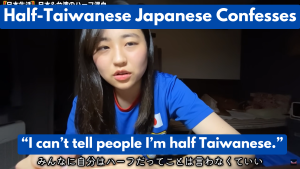Context
This video is an analysis of romantic scam strategies that target men in Japan. In April 2024, a famous female romantic scammer known as “Sugar Baby Riri” (頂き女子りりちゃん Itadakijoshi Riri-chan) was sentenced to 9 years in prison for fraud. She sold books about how to scam men. (Source: https://www.asahi.com/ajw/articles/15242651) Her style of romantic scams, which she publicly advertises on the internet, is called Itadaki-joshi 頂き女子, which loosely translates into “women who ask for favors.”
The YouTuber doing the analysis is Nakata Atsuhiko 中田敦彦, a comedian who graduated with a degree in economics from one of Japan’s top universities, Keio University. His channel is called Nakata University, which is educational and focuses on analyzing socio-economic and political issues.
The English term “Sugar Baby Riri” is actually a mistranslation. Her romantic scam style, Itadaki-joshi, is actually different from the common understanding of sugar babies in Japan. In Japan, papa-katsu パパ活 (“sugar daddy activities”) refers to women and underage girls who form pseudo-romantic and sexual relationships with men in exchange for money. Unlike prostitutes and sugar babies, Itadaki-joshi do not have physical relationships with their male patrons. Sugar Baby Riri is “successful” because she figured out how to extract money from men without providing sexual favors, which distinguishes her from sugar babies. What she does is not called papa-katsu in Japanese.
WARNING
The following analysis contains very detailed steps and strategies of romantic scams. It contains concrete details of psychological and emotional manipulation used by scammers. The analysis is meant to help people recognize and prevent scams. Please do not use these strategies to scam others.
Highlights
- Definition: Itadaki-joshi are women who engage in romantic scams by simulating a romantic relationship without physical intimacy. They avoid physical relationships to minimize risks while maximizing profit.
- Long-term Engagement: Itadaki-joshi maintain long-term platonic relationships with their victims. This continued interaction enables repeated financial gains while convincing the victims into believing that the relationship is genuine.
- Target Victims: Their main targets are lonely middle-aged single men with moderate incomes and no hobby or passion that consumes money.
- Core Strategy: They pose as struggling, innocent women needing financial help for essentials like rent or food. They pretend to be frugal and do not show interest in luxury. This discourages their victims from expecting sexual favors in return for giving them money.
Translation and Analysis
Definition of Itadaki-joshi (“women who ask for favors”)
The Itadaki-joshi style of romantic scams simulates a romantic experience without providing physical intimacy. Itadaki-joshi scammers aim to form deep emotional and psychological connections with their victims to ask for financial favors later. The Itadaki-joshi style is highly strategic and focuses on emotional and psychological manipulation, which differs it from conventional sugar babies. To get money from their victims, they invent lies about having financial troubles with the goal of pushing their victims into helping them out financially. Unlike typical scams, Itadaki-joshi do not disappear immediately after they obtain money from their victims. Instead, they continue the relationships with their victims for a long time and keep extracting money from them. When the relationship ends, it’s usually the male victim who cuts ties because he is no longer able to financially “help” or he has lost interest in the pseudo-romantic relationship.
Why it’s difficult to define Itadaki-joshi as fraud
Since victims are providing money voluntarily, it’s arguable that they are voluntarily paying for a romantic experience. If the victims are voluntarily paying for a service, it’s often difficult to define it as fraud. Moreover, victims believe the relationship is genuinely, so they don’t report the scammers to the police, which makes it impossible for the police to act.
Sugar Baby Riri’s Itadaki-joshi strategies based on her book
** Note from translator: please only use the following information to recognize and prevent scams! **
3 steps of extracting money from victims
- Build a trusting relationship
Before asking for money, Itadaki-joshi spend a long time building trust with their victims. They are very skilled in simulating a romantic relationship and making victims believe that they are in love and in a genuine relationship. - Ask for money
After they have successfully convinced their victims into believing that they are in a loving relationship, they ask for financial help. - Aftercare
This step is what distinguishes Itadaki-joshi from other types of scams. Itadaki-joshi do not disappear right after they have obtained money. Instead, they provide very substantial “aftercare” after getting money from their victims. According to Sugar Baby Riri, aftercare is the most important step. Aftercare prevents victims from seeing the relationship as a scam, which drastically reduces the likelihood that they will report the interaction as fraud to the police. If the victims don’t report to the police, Itadaki-joshi don’t get caught. Sugar Baby Riri’s arrest was not due to reporting by her victims. Her victims didn’t report her. Her arrest was triggered by the aftermath of her selling books about how to scam men.

How Itadaki-joshi define their goals and characters
- Masters of the Itadaki-joshi style should be able to extract more money from men without physical relationships than women who sell their bodies. By avoiding physical relationships, Itadaki-joshi face much lower risks while enjoying much higher profits.
- Itadaki-joshi have a clear financial goal in mind in terms of how much they want to make. It’s much easier to plan and achieve goals if there are clear numerical goals.
- Itadaki-joshi carefully design who they are, which involves strategically inventing life stories and personalities. To extract money from men, they must present a tragic life story such as having grown up in an abusive family. They must emphasize that they are lonely due to social isolation caused by reasons like having no friends and being unable to find a boyfriend. By portraying oneself as lonely and isolated, it’s easy to convince the victim that he is the only one who can help.
- In terms of appearance, Itadaki-joshi aim for a natural and innocent look by using thin make-up, not dying or perming their hair, and wearing light color clothes. They avoid expensive brands in order to portray a frugal image, which is helpful when asking for money. They present the image of an innocent victim of financial pressure.
How Itadaki-joshi find their targets
- Itadaki-joshi target middle-aged men.
- Sugar Baby Riri identifies 3 types of men: the taker, the matcher, and the giver. The taker is someone who is self-centered and narcissistic. The matcher is someone who looks for a strategic partner who has mutually beneficial matching goals. The giver is someone who wants to help others without conditions attached. Itadaki-joshi must be able to clearly recognize which category a man falls into.
- The taker is hyper-focused on getting something from others, such as sexual favors. The taker is very clear about what he wants and cannot be manipulated. Itadaki-joshi do not engage takers.
- The matcher is willing to compensate others for providing values and forming mutually beneficial relationships. He is willing to compensate women for providing a romantic experience. While it’s possible to extract money from matchers, there is usually a limit on how much they are willing to pay, since they are only willing to pay the fair price. It’s hard to get more than 2.5 million yen from matchers. Moreover, matchers want to get their money’s worth of services, so they will eventually expect sexual favors, which contradicts the Itadaki-joshi strategy of not providing sex.
- The giver is the prime target of Itadaki-joshi. There is no limit on how much you can extract from givers. The giver is motivated by his desire to help. He does not want you to provide sexual favors in exchange.
How Itadaki-joshi identify givers
The giver usually has the following characteristics:
- At least 40 years old
- Single
- Not attractive to women
- No ambitious goal
- No passion or hobby
- Annual salary of no more than 10 million yen
- Source of income should be employment rather than owning businesses or investments
Contrary to popular assumptions, it’s not easier to extract money from the rich. Men who make more than 10 million yen tend to be shrewd business owners, who are hard to scam. The giver should be someone who has a moderate amount of money but nowhere to spend the money. He has no wife, no girlfriend, no business, no ambition, and no passion. If he doesn’t already have something in his life that consumes money, he is primed to be scammed. The rich can’t be scammed because they have many things in life that consume money, such as investments, businesses, and social circles.
Where Itadaki-joshi find givers
- Dating apps
- Adult entertainment places that provide pseudo-romantic and sexual experiences (e.g. girls’ bars, adult massages, strip clubs, etc)
These are places where you can find lonely men. If the giver is met through dating apps instead of meeting in-person, building a trusting relationship takes longer. It’s easier to build trusting relationships by meeting victims in person in adult entertainment places. If a victim is met through dating apps, there is usually a lower limit on how much money you can expect to extract from him. Victims met in person have much higher financial potentials. After meeting a victim in person, Itadaki-joshi actively ask for his contact information. If a man actively asks for a woman’s contact information before she initiates the ask, he is likely a taker, which makes him not the right target. Givers are more passive and timid. When asking a giver for his contact information, Itadaki-joshi emphasize that they usually don’t do this with strangers and this is the first time they ask a stranger for his contact information. To convince the victim that they aren’t used to asking strangers for their contact information, Itadaki-joshi would pretend to be hesitant and confused about the process. For example, they might intentionally make mistakes when showing the QR code for the victim to add them on messaging apps.
How Itadaki-joshi groom givers into giving them money
Itadaki-joshi aim to manipulate a giver into craving a relationship where he keeps giving and wants nothing in return. When talking with a victim, Itadaki-joshi pay close attention to what he likes and dislikes. They do research on the victim’s interests and initiate conversations using the knowledge acquired through research. They only start talking about themselves after carefully listening to the victim and learning all about the victim. This way, they can tailor who they are according to what the victim likes. They avoid talking about things that will reduce the victim’s interest like male idols and male celebrities. They pretend to have no interest in other men. They might even invent stories about being hurt by men in the past to explain why they are not interested in other men.
To extract sympathy from their victims, Itadaki-joshi pretend to be hard workers and often talk about their efforts at work. They portray themselves as having little money despite working very hard. They send photos of cheap meals they eat and talk about their tight budgets for day-to-day expenses. They also talk about their health problems to inspire sympathy. They lie about getting ill.
Itadaki-joshi create the illusion of a relationship by establishing daily communication routines like sending good morning and good night messages. After such routines are established, they start asking for small favors to get the victim to be comfortable with doing favors. Initial small favors include things like asking for photos with specific instructions. They also manipulate their victims by creating a false sense of responsibility and obligation. For example, they might ask the victim to apologize for not sending a good night message.
Itadaki-joshi generally keep the relationship to messaging only. If the victim tries to call or meet her, she will make up excuses to reject his attempts like being afraid of phone calls and living in a women-only dormitory.
Right before asking for a big financial favor, Itadaki-joshi would cut off communication for a few days. After the victim’s repeated attempt to contact them, they would reappear and pretend to be hesitant about explaining why they disappeared. After the victim keeps pushing for an explanation, they would explain that they are in financial trouble. The trick here is that they would only disclose information about the financial trouble after being repeatedly pushed by the victim, which creates the illusion that it’s the victim who’s voluntarily offering help. If they have already established a back story of having an abusive family and no friends, the victim would naturally think that he is the only one who can help. If the victim questions if he’s being used for money, Itadaki-joshi will point out that they didn’t even want to tell him about the financial trouble and it was him who pushed for it.
After the victim offers financial help, Itadaki-joshi will refuse his help at first. They will tell him that they will try to figure out a solution without his help. They will then cut off communication again for a few days. After the victim reaches out repeatedly, they will reappear and explain that the financial trouble has gotten worse. They would talk about being so desperate that they will make money through illegal means. The victim will now feel a strong sense of urgency to insist on helping. After the victim repeatedly insists on helping, they will finally accept his money. Through creating the illusion that the victim is voluntarily helping due to genuine concern, Itadaki-joshi turn victims into long term sources of income who keep giving without asking for anything in return.
In summary, the Itadaki-joshi strategy invented by Sugar Baby Riri is about manipulating the victim into helping out an innocent woman who is poor and in financial troubles. Unlike other types of romantic scams, victims of Itadaki-joshi do not think they are paying for a woman’s expensive lifestyle and buying non-essential things. Itadaki-joshi emphasize that they only need the money for essential things like rent and food, which discourages victims from wanting sexual favors in return. Itadaki-joshi aim to manipulate victims into selfless contributions driven by sympathy and kindness, not sexual desires.
Support us with a one-time donation: https://buymeacoffee.com/japanmediareview
Tired of learning about Japan through Western interpretations? Japan Media Review translates Japanese media to show you what Japan is really talking about.
Bluesky Social: @japan-media-review.bsky.social
YouTube: https://www.youtube.com/@JapanMediaReview
Exclusive content on Patreon: https://www.patreon.com/c/JapanMediaReview



